News
The tangled web of California cardrooms and third-party proposition players
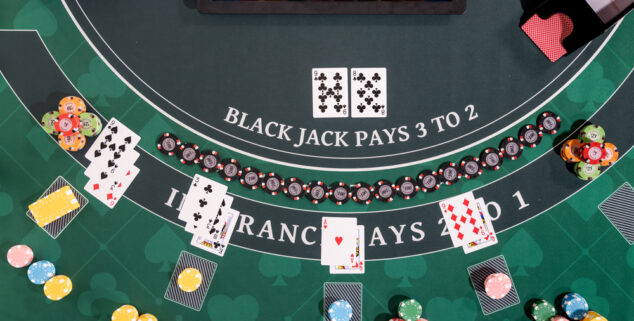 Image by Netfalls Remy Musser
Image by Netfalls Remy MusserThe Commerce Casino in Commerce, Calif. is only about a half-hour drive north of the Gardens Casino in Hawaiian Gardens. But, for a time at least, the two Los Angeles-area cardrooms were authorized to be much, much closer than that.
In fact, you might argue that their finances were once allowed to be so interconnected that they could have actually operated as a single gaming entity rather than two separate facilities, despite having completely independent ownership groups.
If that sounds strange or confusing, it’s because confusion and complexity are features, not bugs, of the bizarre subculture of California cardrooms and their related entities, third-party proposition players, or TPPPs, which tie cardrooms together into sprawling networks of interwoven gaming businesses that seem to work in concert with one another.
Gaming tribes’ fight over ‘California Blackjack’ and TPPPs
For weeks now, Capitol Weekly has been reporting on a long-simmering fight between California’s gaming tribes and its cardrooms over “California Blackjack,” an obscure derivative of the popular table game invented essentially to circumvent state law.
Under Proposition 1A, approved by voters in 1999, Native American tribes have the exclusive right to operate card games using house money in California. Those are so-called “banked” games, like Blackjack and Baccarat, which pit gamblers against the house.
California cardrooms, however, insist they employ a workaround that legally allows them to offer banked card games through the use of TPPPs, which are special, licensed businesses that work within cardrooms.
Under their arcane system, representatives of TPPPs volunteer to act as the house or bank at every cardroom table where banked games are played. Before a cardroom dealer deals a hand of Blackjack, the dealer offers all of the players at the table the opportunity to serve, for a hand or two, as the house or bank.
California cardrooms insist they employ a workaround that legally allows them to offer banked card games through the use of TPPPs, which are special, licensed businesses that work within cardrooms.
Most cardroom players don’t have the financial wherewithal to cover that kind of action. But TPPP representatives do. So TPPP employees, who often wear badges identifying themselves as working for a TPPP and not the cardroom itself, volunteer to play the role of the bank every chance they get.
Cardrooms insist this convoluted system does not violate California law because they are not serving as the house or bank. TPPPs are – and under California’s rules, TPPPs have to be financially independent from the cardrooms where they work.
This requirement – financial independence – is the critical component holding the entire cardroom-TPPP artifice together.
If a TPPP were financially connected to the cardroom in which it worked, the TPPP and the cardroom would be violating state law. That’s because, in effect, the cardroom would have a stake in the hand, making the game one in which house money was being wagered.
Again, under state law, only tribal casinos may offer such games.
So, TPPPs cannot have any financial ties to the cardrooms in which they operate. But the law is silent on whether TPPP owners can also own stakes in other cardrooms.
That’s where it gets interesting.
TPPP owners and cardroom owners are often one and the same
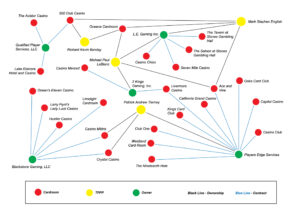
Enlarge image here.
Currently there are 27 TPPPs licensed to operate in California. Nine of them – a third – are owned by individuals who are also licensed as owners of California cardrooms.
Capitol Weekly found no evidence of a TPPP operating in a cardroom with the same owner. Rather, what we mainly found were situations like Michael Paul LeBlanc’s.
LeBlanc is part owner of the Ace & Vine cardroom in Napa Valley. He is also part owner of the TPPP L.E. Gaming, Inc. and the sole owner the TPPP 2 Kings Gaming, Inc.
2 Kings Gaming operates within the Livermore Casino cardroom in Livermore and Casino Merced in Merced.
L.E. Gaming operates within the Tavern at Stones Gambling Hall and the Saloon at Stones Gambling Hall cardrooms in Citrus Heights, the Seven Mile Casino cardroom in Chula Vista and the Casino Chico cardroom in Chico.
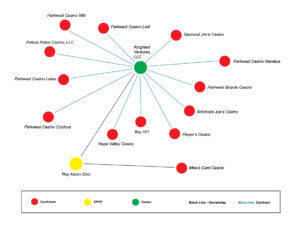
Enlarge image here
LeBlanc owns L.E. Gaming with Mark Stephen English. LeBlanc, English, Richard Kevin Barclay and LEB Holdings, Inc. own the Oceana Cardroom in Oceana, which has an active license but is not operating. Barclay, English and K & M Casinos, Inc. own the 500 Club Casino cardroom in Clovis.
English also owns Ace & Vine with LeBlanc, as well as Gabriel M. Pattee and Polvora Inc.
The TPPP Players Edge Services, owned by Patrick Andrew Tierney, Jamie Kay Shigg and David Alan Shindle, has contracts within 10 cards rooms, including Ace & Vine and the Livermore Casino – the same cardroom also served by LeBlanc’s TPPP 2 Kings.
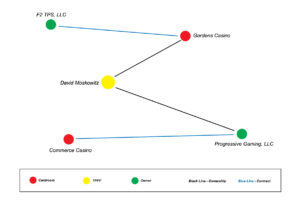
Enlarge image here.
Livermore Casino is part owned by Patricia Ann LeBlanc, Michael Paul LeBlanc’s mom. For a time, they together operated a company called Certified Players Inc., but it was later given over solely to Michael Paul LeBlanc and is now terminated. Patricia Ann LeBlanc, who goes by Trish, told Capitol Weekly that she and her son Michael are financially independent from each other. (Michael Paul LeBlanc didn’t respond to a request for comment.)
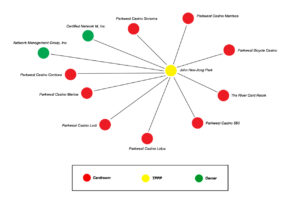
Enlarge image here.
Tierney, the part owner of Players Edge, is also part owner of the Crystal Casino cardroom in Compton and part owner of the Casino M8trix in San Jose. The TPPP Blackstone Gaming, LLC, owned by Tuan Van Thai, serves both Crystal Casino and Casino M8trix, as well as four other cardrooms.
As we said, it can be confusing.
A network of businesses concealed within two agencies’ changing records
The above examples are provided to show just how interwoven the ownerships are between TPPPs and cardrooms. These two types of businesses – which, again, are supposed to be financially independent from each other – in reality operate as a sort of an interconnected network of collaborating companies.
Some might argue it looks bad for a TPPP owner to also have a stake in a cardroom. But it could also be just as easily argued that the best person to run a TPPP is someone intimately familiar with cardrooms and their operations.
Whatever the case, no rules are being broken so long as a TPPP doesn’t operate within a cardroom owned by the same person – which, again, Capitol Weekly never found when it cross-referenced the cardroom owner list and the TPPP owner list posted on the California Gambling Control Commission’s website.
Capitol Weekly actually had to cross reference those ownership lists three times over the last several months, because the information posted on the commission’s website has changed repeatedly to update the latest ownership structures. (The last time we cross referenced those lists was Oct. 18.)
But what if two groups of people owned a set each of a TPPP and a cardroom, and they placed their TPPP in each other’s cardroom? Would that be legal – or ethical?
Capitol Weekly got a list of current TPPP contracts with cardrooms on August 31 from the California Department of Justice’s Bureau of Gambling Control, the other agency that regulates gambling activity in the Golden State. In an email, the bureau said TPPP “contracts with cardrooms are not available to the public.”
In short, there’s a lot of data to sift through, and some critical pieces of information the public isn’t allowed to see. But based on everything we’ve been able to review, Capitol Weekly couldn’t find any ownership relationships that were illegal or inappropriate under state law.
But what if two groups of people owned a set each of a TPPP and a cardroom, and they placed their TPPP in each other’s cardroom? Would that be legal – or ethical?
That’s known as “cross-banking,” and it was authorized to happen for a time in Los Angeles County with the Commerce Casino and the Gardens Casino.
Commerce and Gardens casinos once were allowed to bank for one another
If you’re not familiar with Commerce Casino and Gardens Casino, they’re far and away the biggest cardrooms in California. Both boast licenses for 374 gaming tables each.
The next largest cardroom, the Parkwest Bicycle Casino in Bell Gardens, has a license for 200 tables. All of the remaining 79 licensed cardrooms in the state are only allowed to have up to 91 tables or less.
Sixty-two are licensed for only up to 19 tables or less. Thirty-nine, including Ace & Vine, are only allowed to have up to nine or less tables.
In all, there are 82 licensed cardrooms in California. Eighty of them are licensed to have a total of 1,455 tables. Combined, Commerce and Gardens are licensed to have about half that – 748 tables. They’re the biggest fish in the California cardroom pond.
David Moskowitz is licensed as a part owner of Gardens Casino and part owner of the TPPP Progressive Gaming, LLC. (The California Gaming Association, which represents California cardrooms, says that Moskowitz isn’t “an equity owner” of Gardens, but rather serves as its CEO. The association says that cardroom officers and directors have to obtain owner licenses, even though they’re not technically owners.)
More than 50 people and trusts are part owners of both Commerce Casino and a TPPP called Acme Player Services, LLC.
Progressive Gaming currently has a contract to provide TPPP services to Commerce Casino. The bureau approved a contract for Progressive Gaming to provide TPPP services to Commerce Casino on March 10, 2020 and another approval was granted on January 10, 2022. (TPPP contracts “are generally valid for up to two years, per contract,” according to the Bureau of Gambling Control. The bureau refused to give Capitol Weekly the end dates of any TPPP contracts, saying to do so would be against the law.)
The TPPP F2 TPS, LLC, owned by Linyi Feng, currently has a contract to provide services to Gardens Casino. But Acme Player Services used to provide TPPP services to Gardens Casino.
The bureau initially approved a contract for Acme to provide TPPP services to Gardens Casino on January 31, 2010 and consistently approved new contracts between Acme and Gardens until January 2020. The bureau says Acme was given one final, 60-day contract extension to continue serving Gardens on January 15, 2020. The California Gaming Association says that Acme stopped providing TPPP services to Gardens in March 2020, due to the pandemic. (The bureau also approved Acme to provide TPPP services to The Aviator Casino in Delano, California on April 9, 2013. Acme currently has no active contracts with any California cardrooms.)
In other words, for a short period of time, in March 2020, the owners of Commerce and Gardens cardrooms were authorized to bank each other’s games (although the pandemic apparently got in the way). Commerce was authorized to bank Gardens’ games through the Acme TPPP operating in Gardens. Gardens was authorized to bank Commerce’s games through the Progressive TPPP operating in Commerce.
Given those contracts, could those TPPPs really be financially independent from the cardrooms?
That’s controversial.
The California Gambling Control Commission says cross-banking is legal. The cardrooms agree. (California’s other gambling regulator, the DOJ’s Bureau of Gambling Control didn’t respond to multiple requests for comment from Capitol Weekly on this particular issue.)
But California’s gaming tribes say cross-banking flies in the face of state rules requiring TPPPs to be financially independent from cardrooms. If the owners of two cardrooms are banking each other’s games, how can they be financially independent, they ask? Isn’t that a closed system, with no financial independence?
The California Gaming Association says the TPPPs and cardrooms in this situation are “are financially independent and the repeated audits by the Bureau have shown that. The Bureau has never found any financial relationship other than what is approved in the contracts.”
California’s gaming tribes say cross-banking flies in the face of state rules requiring TPPPs to be financially independent from cardrooms. If the owners of two cardrooms are banking each other’s games, how can they be financially independent, they ask?
The California Gaming Association emphasized to Capitol Weekly that cross-banking is not occurring in California today and, indeed, we found no evidence that it is. Still, California’s gaming tribes strongly oppose the concept and the commission’s comfort with it.
“If it doesn’t violate the law directly, doesn’t it violate the spirit of the law?” asked Jeffry Butler, an attorney for the Yocha Dehe Wintun Nation, which owns and operates the Cache Creek Casino Resort, an hour west of Sacramento.
“I don’t see how that is something that is appropriate or legal,” Butler said about cross-banking. “You have to avoid the appearance of impropriety,” he added.
A stubborn point of contention
Tribal representatives were unhappy when Capitol Weekly showed them versions of the social network diagrams appearing with this story, which attempt to depict, in a visual form, the connections between cardrooms and TPPPs.
“It’s incestuous, that’s what it is,” said Tuari Bigknife, attorney general for the Viejas Band of Kumeyaay Indians, which owns and operates the Viejas Casino & Resort near San Diego. “When you look at the trail and the connections, calling these entities third parties is a fallacy. Third parties in name only.”
Said Butler: “It’s hard to even fathom, there’s lines going everywhere.”
When asked to respond to the tribes, Becky Warren, spokeswoman for the cardroom’s California Gaming Association, said in a statement to Capitol Weekly, “Cardrooms and third party [sic] proposition player service companies have been operating legally for decades with approvals from two state regulatory agencies.”
The cardrooms, obviously, don’t see any problem with cardroom owners also owning TPPPs. But the issue isn’t likely to go away.
On September 11, the Bureau of Gambling Control announced that it intends to promulgate new regulations governing the rotation of the player-deal position and Blackjack-style games at cardrooms – in other words, it intends to change, or at least explore changing, the way cardrooms and TPPPs operate.
Four letters from tribal gaming interests (a letter from Agua Caliente Band of Cahuilla Indians, a joint letter from the California Nations Indian Gaming Association and Tribal Alliance of Sovereign Indian Nations, a letter from the Pechanga Band of Indians and a separate letter from the Tribal Alliance of Sovereign Indian Nations) included, verbatim, the same request of the bureau as it considers these new regulations:
“To protect the integrity of the industry, the regulations also should expressly prohibit any person or entity with an ownership interest in a cardroom from also having any financial interest in a TPPP or a TPPP funding source.”
It is still too early in the process to know or even guess what any changes could look like. For its part, the bureau has made clear in its announcements that it has “not yet initiated the formal rulemaking process,” though it has begun to seek public input on its ideas.
This story has been updated to note that changes listed on the California Gambling Control Commission website are to update the latest ownership structures. We will be reporting on the proposed changes to California cardroom regulations next week.
Want to see more stories like this? Sign up for The Roundup, the free daily newsletter about California politics from the editors of Capitol Weekly. Stay up to date on the news you need to know.
Sign up below, then look for a confirmation email in your inbox.

[…] Because of this separation, they argue, the use of TPPPS does not equate to house-banking games. As Capitol Weekly reported in 2023, however, the relationships between card rooms and TPPPS providers are interwoven […]
[…] TPP providers. As mentioned, the two sides are supposed to be fully independent, but analysis from Capitol Weekly has shown that those delineations are complicated and difficult to […]